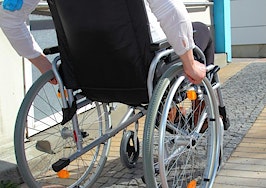- Since 2005, when 13 percent of millennials lived with parents, the rate at which they are staying home increased to 21 percent.
- El Paso, Texas, has the most millennials living at home at nearly 34 percent.
- All the cities with the fastest rising rents -- more than 4 percent -- are west of the Mississippi.

Downtown Riverside, Calif./Flickr user Ken Lund
First-time homebuyers are entering the housing market at a slow clip. Many are renting an apartment, but others are sticking with the roommate they know and love: Mom.
According to a recent analysis released by Zillow, millennials aged 24 to 34 are living with their mothers today more than any time in the last decade. Since 2005, the number of millennials living with their parents has been on the rise — 8 percent to be exact. Today, 21 percent of the 24-to-34 age bracket lives with Mom.
“With today’s high rents and lagging income growth, many young people are having trouble setting aside enough money to buy their own home, delaying home ownership,” said Zillow Chief Economist Dr. Svenja Gudell. “Living with their parents may allow young people to continue to do things like continue their education, save enough money for first and last month’s rent, or save for a down payment.”
The city with the largest percentage of millennials living with parents is El Paso, Texas, where almost 34 percent of the age group live at home. Compare this to Houston, where 21.2 percent of millennials are living with their parents, and average rent is expected to increase 1.6 percent.
New York, Los Angeles, Miami and Riverside, Calif., are also home to a large percentage of millennials still living with their parents, with all four metros having more than 30 percent of its millennials living at home.
In 2014, Miami had 33.4 percent of its millennials living at home — an increase of 17.6 percent from 2005. According to the Zillow Rent Index, rent in Miami for the first quarter of 2016 was $1,847, and prices are forecasted to rise another 3.5 percent annually.
Washington D.C. had about 20.4 percent of millennials living at home in 2014. In the nation’s capital, rents are expected to increase about 1.4 percent from the first quarter of the year, which was reported at $2,116.
Midwest rents are calling millennials living at home
There were a few select metros that are expected to see a year-over-year decline of rental prices in 2016, and all of them are cities in the Midwest. Chicago, St. Louis, Indianapolis and Cleveland are expected to see a drop in rental prices, which may help sway more millennials to leave the nest.
Cleveland, where 22 percent of its millennials were living at home in 2014, is forecasted to see a 1.4 percent drop in rental prices in 2016.
[Tweet “Chicago rents expected to drop 0.3 percent this year”]
In 2014, Chicago saw 24.4 percent of its millennials aged 24 to 34 living with their parents. In the first quarter of 2016, the Zillow Rent Index was reported at $1,636, which is considerably low compared with other major metros. The Zillow Rent Index is expected to drop 0.3 percent annually.
Biggest rental prices increases west of the Mississippi
San Francisco, Denver, Seattle and San Jose are just a few of the cities expected to see a rental price increase of at least 4 percent. In San Jose, where 23.9 percent of millennials still live with mom, the first quarter ZRI was $3,472, and prices are forcasted to increase by 8.8 percent annually.
[Tweet “San Jose rents to increase 8.8 percent annually, says Zillow”]
Riverside has the highest volume of at-home millennials, with 32.7 percent of them living with mom. The Southern California city is expected to see a rental price increase of 2.4 percent.
Nationally, rental prices are expected to increase, according to Zillow. While incomes remain fairly stagnant, the trend of millennials shaking up with parents may continue.





